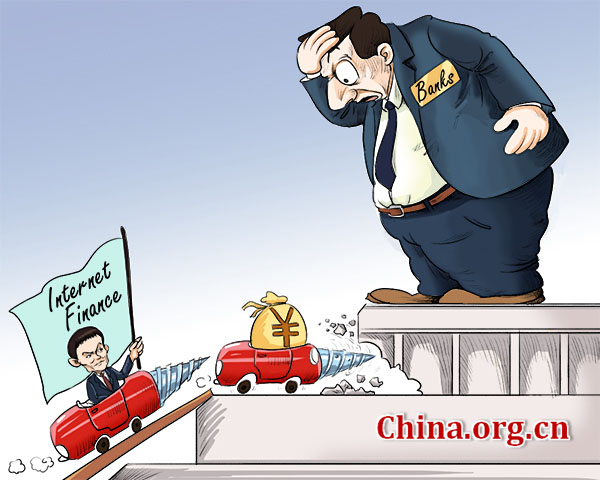China's e-commerce explosion will shake the world
- By Dan Steinbock
 0 Comment(s)
0 Comment(s) Print
Print E-mail China.org.cn, April 10, 2015
E-mail China.org.cn, April 10, 2015
|
[By Yang Yongliang/China.org.cn] |
Recently, the State Council, China's cabinet, announced that it will boost the development of e-commerce by cutting red tape and liberalizing investment regulation in the sector. Reportedly, the new measures include a tax cut, simpler administrative procedures and a push for entrepreneurship.
During the past two decades, I have explored the rise of the information and communication technology sector first in America and then worldwide, starting with "The Triumph and Erosion in the American Media and Entertainment Industries" (1995) and "The Birth of Internet Marketing Communications" (2000). As the ICT sector unleashed an explosion in mobile communications, I focused on "The Nokia Revolution" (2001), the explosion of "The Mobile Revolution" (2007) and the subsequent spread of the mobile revolution in the United States, Europe, Japan, China and India.
What we are witnessing now is a dramatic shift in momentum in the ICT sector from the West to the East.
From the "Internet plus" strategy to e-commerce expansion
The new momentum behind e-commerce policy will contribute to and reflect the transition from reliance on manufacturing, investment and net exports to reliance on innovation and consumption. But it is also part of a broader, more comprehensive policy strategy.
Recently, Premier Li Keqiang said that China will back e-commerce development and guide Chinese internet companies' international expansion. Speaking at the annual parliamentary meeting in Beijing, Li outlined China's "Internet Plus" strategy, which embraces cloud computing, online banking, mobile internet, and logistics to help e-commerce expansion.
Li also called for more public investment in the internet sector. In addition to the 40 billion yuan ($6.4 billion) already invested in China's emerging industries, he pushed for more funds for "business development and innovation."
This was all manna from heaven to China's legendary internet companies, such as Alibaba, the world's largest e-commerce company, which has invested in cloud computing and internet finance, and its rival JD.com, which has seen transactions more than triple in its online marketplace.
Other internet giants stand to gain as well, including social networking and entertainment company Tencent and online search firm Baidu, both of which own internet finance operations and seek to expand internationally. Still others that stand to gain include more traditional players that have significant internet properties, including shipping and logistics firms China Cosco, China Shipping Container Lines and Sinotrans, and local delivery firms YTO Express and S.F. Express.
Chinese e-commerce fuels global e-commerce
As the new policies seek to increase private consumption and investment in e-commerce, they are creating new growth points for the economy. The timing of these policies is favorable. Since penetration levels are still low in e-commerce, there is much potential for growth. At the same time, the global momentum in e-commerce will shift to China.
In 2014, turnover in Chinese e-commerce surged 25 percent to 13 trillion yuan ($2.1 trillion) on a year-to-year basis. Today, almost every fourth internet user worldwide is in China. That translates to more than 640 million internet users, which is more than the next three countries together (the U.S., India, and Japan).
The gross merchandise value of China's e-commerce marketplace has almost doubled to 12.3 trillion yuan in the first half of the 2010s. Meanwhile, annual growth in the e-commerce marketplace has remained at over 20 percent.
In advanced economies, the majority of users rely on personal computers, laptops and tablets to access the internet. In emerging economies, the entry point – at least initially – has been the mobile phone. In China, the number of mobile phone subscribers climbed to nearly 1.3 billion in 2014, while the penetration of mobile phone use soared to 78 percent.
However, e-commerce requires greater capabilities, that is, smartphones. The use of smartphones has exploded as well. Among mobile phone users, the share of smartphone users increased to some 43 percent last year.
Mobile shopping is currently expanding twice as fast as traditional e-commerce and may maintain a 48 percent compound growth rate over the next few years, driving the expansion of the overall e-commerce market.
China became the world's largest online retail market in 2013, when total sales reached $307 billion. In February, research firm Forrester estimated that that figure hit $440 billion in 2014 (10 percent of total retail sales in China), and total online retail sales are expected to reach $1 trillion by 2019.






